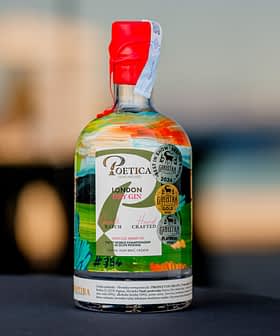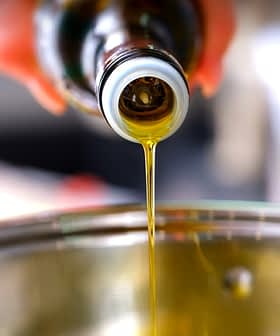Olive Oil Health Benefits for Dogs
Olive oil offers a wide range of benefits for dogs, including healthy skin, reduced inflammation, cardiovascular protection and reduced risk of diabetes.
 Misty
Misty  33.1K reads
33.1K readsThe Mediterranean diet, particularly olive oil, offers numerous health benefits for dogs, including improved skin, coat, heart health, and immune system function. It is recommended to add small amounts of extra virgin olive oil to a dog’s food for optimal benefits, but moderation is key to avoid weight gain or digestive issues.
The Mediterranean diet not only benefits human health, but it also offers a wide range of advantages for dogs, too.
Olive oil is the primary source of fat in the Mediterranean diet, which is associated with benefits for cardiovascular health. Unsurprisingly, it is natural for caring pet owners to want to share the remarkable health benefits of olive oil with their dogs.
“With the numerous health benefits of olive oil for the human diet, you may have wondered, ‘is olive oil good for dogs too?’” Kym Hough, the chief marketing officer of California producer McEvoy Ranch, told Olive Oil Times. “The resounding answer is yes, olive oil offers many benefits for dogs.”
See Also:Health News“Olive oil contains phytonutrients, vitamin E and omega‑3 fatty acids which help keep dog’s skin moisturized and well-nourished for a healthy, beautiful coat,” she added. “Additionally, olive oil is rich in antioxidants, which have been shown to fight free radical damage and boost the immune system effectively.”
According to Rover, a pet care services platform, olive oil helps your dog’s health in four ways: skin, weight, taste, and immune system.
Recent studies confirm that extra virgin olive oil prevents dry skin, soothes scaling skin, supports heart health, and reduces inflammation. For senior dogs, these can be life-changing benefits to help dogs stay agile, flexible, and active.
The benefits of extra virgin olive oil include its ability to promote healthy skin, ease itching associated with allergies and reduce inflammation.
Christopher Reeder, a board-certified dermatologist at BluePearl Veterinary Partners in Franklin, Tennessee, told Chewy that the luster and shine in dogs’ coats could be observed after about 30 days of dietary olive oil supplementation.
However, experts caution that while putting olive oil directly on the skin may be tempting, dogs tend to lick this off. Rather than get into a sticky mess, they suggest adding a teaspoon of olive oil to their food.
Small amounts of olive oil may be added to dog food to help maintain their ideal body weight. However, vets caution against giving olive oil to dogs suffering from intestinal conditions such as diarrhea or vomiting.
According to the Spanish Olive Oil Interprofessional, a non-profit, olive oil helps prevent heart disease and reduce the risks of diabetes in dogs. Olive oil consumption also boosts dogs’ energy and helps prevent cellular oxidation.
Olive oil can boost immune functioning and help prevent or delay cognitive decline. Key antioxidants such as Vitamin E protect cell membranes from free radical damage. Dogster, a magazine, notes that olive oil is especially beneficial for senior dogs and can help keep their minds vibrant.
Olive oil polyphenols for dogs
Polyphenols, naturally occurring compounds found in extra virgin olive oil, offer numerous benefits for dogs. The potent antioxidants, help to neutralize harmful free radicals and protect cells from oxidative damage. This can contribute to improved immune function and reduced risk of chronic diseases. The anti-inflammatory properties of polyphenols can alleviate joint pain and stiffness in dogs with conditions like arthritis. They also support cardiovascular health by promoting healthy blood flow and reducing the risk of heart disease. Polyphenols have been linked to enhanced cognitive function in dogs, potentially improving memory, learning, and overall brain health. They may also aid in digestion by supporting a healthy gut microbiome and reducing inflammation in the gastrointestinal tract. Certain polyphenols have anti-cancer properties, helping to prevent the growth and spread of tumors. Always consult with a veterinarian before making any dietary changes or introducing supplements to ensure they are safe and appropriate for your dog.
The Chewy report recommends extra virgin olive oil due to its low acidity and rich nutrient contents. However, a holistic veterinarian and report author, Judy Morgan, suggests no more than one teaspoon of olive oil for 20 pounds (9 kilograms) of body weight per meal.
According to the Spanish Olive Oil Interprofessional, a tablespoon of olive oil once or twice weekly is the typical amount to add to your dog’s food.
Some vets suggest one teaspoon for every 30 to 40 pounds (13.5 to 18 kilograms). Recommendations also vary if your dog is experiencing unique ailments, conditions or illnesses.
Many dog food brands are increasingly adding healthy fats, such as olive oil, directly to their products.
According to Rover, olive oil may make your dog’s food palatable and tasty. A little olive oil can help make dry or stale food more appealing. Hough echoes this benefit: “Olive oil improves the taste of their food, which as huge dog lovers, having a happy pup is the best gift of all.”
Extra virgin or virgin olive oil offers healthy dietary fat and protects the cardiovascular system, according to the Innovative Veterinary Care Journal (IVC Journal). The higher-nutrient oil is preferred over non-virgin olive oils due to the extraction method. The IVC Journal noted that virgin olive oil is safe for dogs to consume, even for extended periods.
In Pets Magazine, Therese Tan shares a few guidelines for using extra virgin olive oil in regular dog food. Tan suggests using extra virgin olive oil for a fresher flavor and reduced acid content. However, it is important to consider the impact on their weight. Olive oil contains fat and calories, which may need to be monitored to prevent weight gain.
According to Tan, olive oil may irritate dogs with sensitive stomachs. Therefore, if a dog responds with an upset stomach, it is advised not to give them anymore. Similarly, olive oil might worsen the situation in the case of vomiting or diarrhea.
Moderation is critical for the use of olive oil in canine care. Morgan advises attention to portion control, as extra calories may cause weight gain. Furthermore, experts recommend talking with a veterinarian before adjusting a dog’s diet.
Share this article










